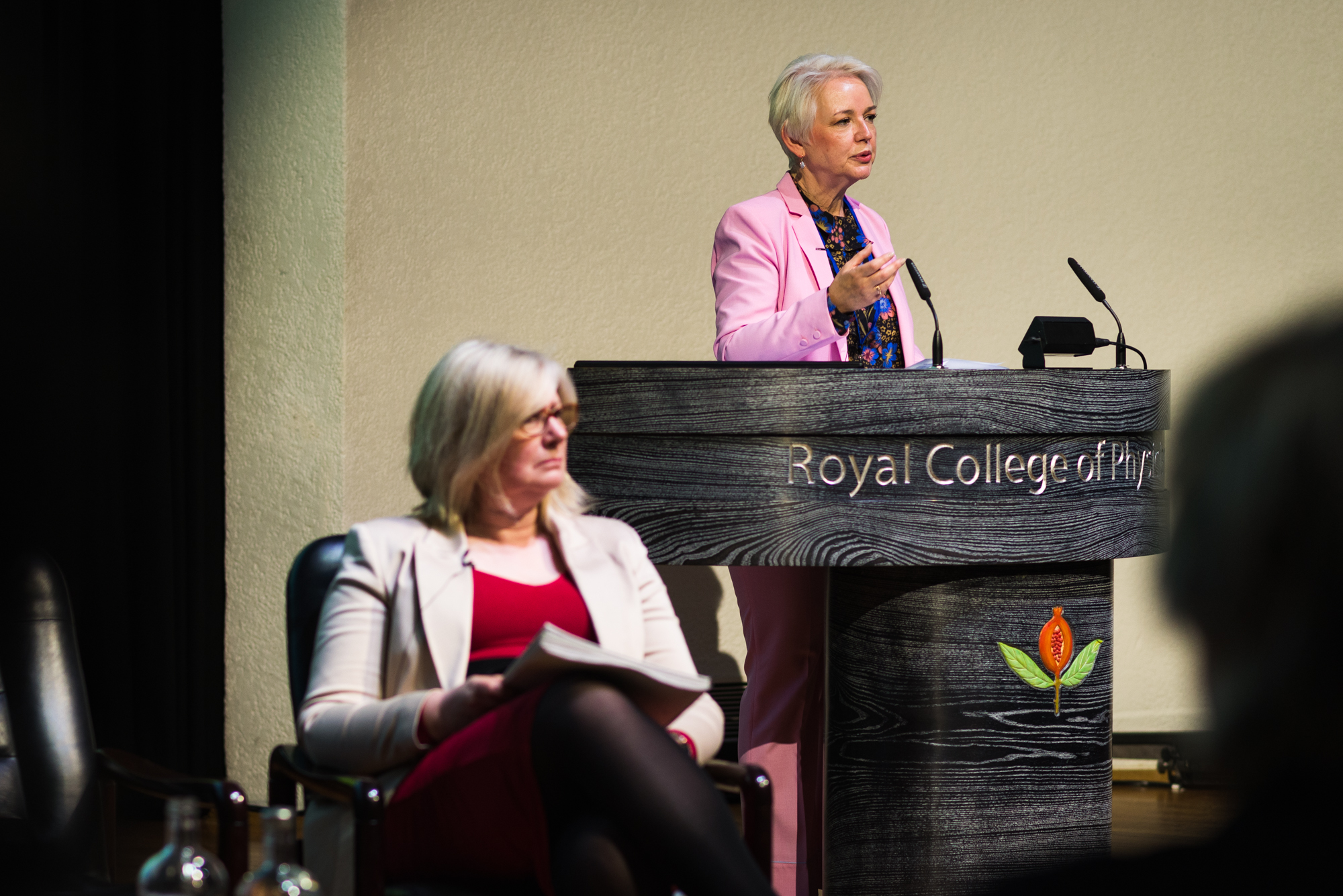Welcome to the “Proceed With Caution” live blog, updated through the day with news, opinions and images from Wonkhe’s summer event. We’ll be discussing everything fees, funding and the future of higher education – you can see the full agenda here.
LIVE: Proceed With Caution, London
Timeline
- Jul 3 2018 17:00
- Jul 3 2018 14:19
- Jul 3 2018 14:02
- Jul 3 2018 10:57
- Jul 3 2018 10:35
Updates
We proceeded with caution…
Jul 3 2018Even by our wonkish standards this has been an intense day of debate – mixing sector politics and political context with concepts from finance and public accounting creates a heady brew.
But what has come through in every session is a concern for the student, seeking to enter a complex and confusing system for reasons neither she nor we can truly understand. The quorum in the room seems to agree that the maintenance grant needs to return, that information on the full cost of study needs to be clearer and less oppressive – and that the review is less an opportunity to rethink the shape of the sector and more a reminder that we ourselves need to get on and do it.
Finance does not run universities – though it can make it a lot easier to do so. And in seeing a review of fees and funding as a review of higher education policy, we misjudge our own place in wider culture and our own potential. There are imbalances and perverse incentives within current financial and regulatory structures – addressing them would help, but it is never the whole picture.
We are facing difficult times – not just linked to a loss of income (and consequent mergers and restructures) post-review, not just Brexit, not just a weak and frightened government happy to attack if it gets a good headline – but rather than waiting to see what happens, it seems like the message of “proceed with caution” is to be bold and clear about our direction, rather than just a cue for yet another defensive PR strategy.
Charles Heymann, Alison Jones, Ian Robinson
Today has given us a taste of the sheer level of uncertainty the sector is facing. When you add the post-18 review to other concerns like Brexit how is it possible to plan for the future? Wonkhe’s Louis Coiffait introduces our final panel, featuring Charles Heymann (Communications and Reputation Advisor), Alison Jones (HESPA Chair, and University of Bradford), and Ian Robinson (HSBC).
Heymann spotted this premise immediately as a cold reading – there has been uncertainty in university funding for at least the last thirty years. But today we are experiencing a clash of political, economic, and social tensions – and we cannot expect the post-18 review to unwind these. The government review is a way to buy itself breathing spaces – though the review itself will be well-evidenced and intelligently framed it will land in a political context and be treated as such.
Jones raised the spectre of institutional failure – with changes in funding, demographic pressures, and increased competition making this more likely than ever before.
Robinson added Brexit to the mix – another challenge that has not yet been faced. The sector is “taking a beating” from a number of sides, within banking the focus has been on international markets and scenario planning.
![]()
Looking longer term – after Brexit, after a possible general election and a possible new government – Heymann felt there was a huge disconnect between the language used in university funding and the realities of running a complex organisation. It is, he argued, hard to run a university – though the IFS have indicated a 25% increase in university funding, many institutions are seeing smaller and smaller margins. How will the sector react when “one of theirs” starts to crumble and fade away?
Robinson felt that the UK sector has a history of rising to the challenges of adversity. A number of institutions are planning for the future in intelligent and world-leading ways. Jones agreed with this analysis, stressing the collaborative way in which the sector can promote itself. Funding needs to follow our ideas as to how the sector will look, a review of funding should follow this understanding, not drive it.
There is danger that governments (and indeed wonks) are out of touch with the way universities are run as federated, devolved, businesses. Though some universities do have cash and others do not, it does in many ways come down to the way each university is managed.
Liz Bromley, David Malcolm, Julie Tam
Wonkhe’s Rachael Firth introduced our panel on the costs of being a student – focusing on the often-ignored issue of maintenance. We moved straight into discussion – with Liz Bromley (UCLAN and University Alliance), David Malcolm (NUS) and Julie Tam (Universities UK) in the three chairs.
Julie Tam highlighted the findings from the recent NEON report, suggesting that there was a general will to see funding flow to higher education, but that the availability of information to individual prospective students varied widely.
For Liz Bromley the key issue is to address the financial barriers that students from disadvantaged backgrounds face in participating in HE. David Malcolm highlighted the decline in mature and part-time student numbers – and noted that the availability of finance has an impact on where and what students choose to study, even if raw numbers do hold up. All three called for the restoration of grants, and the end of a system where the less well off. students graduate with the highest amounts of debt.
![]()
Tam argued that the the system is working well for many mainstream students and is broadly progressive – but the system has not been successful in winning hearts and minds. Students largely “get” the system, but do not see a meaningful difference between student loans and conventional debt – in our society debt comes with an association of burden and consequence. A rose by any other name would smell as sweet – unless that name was “student loan”.
But Malcolm argued that students would see through a “patronising” rebranding exercise and react poorly. A new name would give the impression that the government are trying to hide something.
Tam raised an interesting point around the idea of “graduate” and “non-graduate” jobs – this is an off-putting idea to those entering HE in later life. The skills needs of the economy are broad, and higher education is equally broad – this is a better approach than attempting to predict the future.
Bromley, noting that HE has been in the public doldrums since the Brexit vote, recounted that there is a notable lack of understanding about the system and function of higher education. The review should bring a recalibration of civic understanding of the wider value of higher education.
Malcolm added that the costs of accommodation and transport had risen faster than student maintenance – simply raising students support runs the risk of merely increasing the profit of providers. The debate about participation is too often binary (yes, or no) – we miss out on understanding how choices within HE are artificially limited by a lack of financial support.
Helen Carasso, Linda Drew, Sally McGill
“If you can’t measure it, it can’t be worth doing” – this famous (and likely apocryphal) Thatcherite quote accurately explains the current functioning of the market. Students are encouraged to measure their expenditure against their likely future income.
Helen Carasso highlighted the mixed signals within the student finance offer – are students independent adults, or members of a family that supports them? HE is not a straightforward market – HE is a post-experience good.
Another flaw in the current debate is that it focuses on full-time first degree students who graduate – higher education engages with society on a much wider basis. Carasso suggested employers are getting a bargain at the moment, and suggested employers needed to contribute (perhaps by paying back a proportion of a graduate employee’s student loan).
![]()
The benefits of HE are often non-financial – in terms of civic engagement and health – so the public debate on the costs of HE needs to move beyond the current system. But there are not simple indicators or statistics that we can encourage policy makers to adopt – but perhaps there could be an impact measure for teaching?
Linda Drew hails from Ravensbourne, England’s newest university and a small, specialist, arts institution with a number of commuter students travelling long distances every day. What matters to her is diversity, inclusivity and social mobility. Her recent Guardian article attracted a great deal of interest – in it she describes Ravensbourne’s “talent first” approach, which is expensive but hugely beneficial for non-traditional students.
She highlighted the experiences of “Chris” – one (of many) successful graduates who were supported via clearing through a difficult first year to a hugely gratifying outcome and significant interest from employers. Another alumnus designed Meghan Markle’s wedding dress.
Drew noted that Nicola Dandridge had said that value for money should be a “richer” concept – and supported the idea that students should not have to be faced with hidden costs. Within the post-18 review, we should not lose sight of what the student perceives.
![]()
Sally McGill reported back from a recent BUFDG meeting of finance management. One key question to arise what who should be responsible for explaining to students how the loan system work. There is a real paucity of information in the sector, and each university has to tell their own value for money story – for both students and for the local community.
Universities are extremely complex organisations delivering a range of services. BUFDG have been working on an integrated financial reporting project with Advance HE, which should report in late July. But being a “high cost” institution does not mean that students are better supported.
TRAC has demonstrated that research sees cross-flows (subsidies) from international student fees, and that UK student teaching is largely a break-even business. But this simple summary belies a complex and often subjective reality.
In discussion with Mark Leach
Jul 3 2018Philip Augar has been hugely impressed by the quality and depth of work around the state of the sector – “it’s all there, all the answers are there” – and the diversity of the sector.
What can the sector learning from banking? – quite a bit, says the panel chair! But getting right what is being regulated and for what purpose is important. The lack of coherence across the wider system is still a worry now. Augar spoke favourably of the way that those in HE are there for the right reasons.
![]()
Though this is a government review, led by Number 10, DfE and the Treasury, the purpose of the panel is to produce a set of options and recommendations to inform government policy. But he wants to publish an understandable and sensible report, that doesn’t rip up what is good that already exists.
He was clear that there has been no political interference in the work of the panel. He wants the recommendations to be “future-proof” – it is easy to find previous reports on education at DfE, some great, some fanciful.
From the floor – an interesting question concerning taking into account the consequences for devolved nations. The panel have met Ian Diamond (“a very nice review”) and officials from the Welsh government, they will be careful to avoid unintended consequences.
On language (the choice of terms like “loans”), he restated his aim for clarity in presentation.
And a question highlighting the relative lack of funding in FE prompted agreement that FE plays a role and funding has to be gotten right.
In HE, he felt that that there is not a price sensitive market – the market functions on perceptions of quality.
Philip Augar
Jul 3 2018Philip Augar is an author of a series of fascinating books on banking regulation, and was formerly the Bursar of St Catharine’s College, Cambridge. But he’s here today as the chair of the post-18 review advisory panel – it won’t be the “Augar Review”, but it is probably the biggest news in higher education policy in England right now. We’re glad to have him with us.
He highlighted Theresa May’s speech at Derby College as detailing the very wide scope of the review, from HE to FE, Skills, and Adult Learning. The carefully-chosen panel reflects this wide remit.
He still intends that the panel will report in November, with the DfE’s review concluding in March 2019.
This will be an evidence-based review – starting with the question of what post-18 education should be doing for the country. There are economic and societal requirements to take into account, Augar noted the towns and cities that have “come alive” thanks to the presence of a post-18 provider. But the economic benefit to the sector via higher skills will be of paramount importance (though not an overwhelming consideration). Post-18 education has to oil the wheels of social mobility too.
The panel has already performed a full literature review – and are grateful for the volume and quality of available work. They have met stakeholders, and have received nearly 400 responses to their call for evidence.
The main thrust of the evidence centred around four key themes:
- Student finance – concerns have been raised on terms and conditions, thresholds, interest rates, and the unfairness of the current system to non-traditional students.
- Institutional funding – it was argued that fees are not related to the cost of provision, and institutional efficiency. Funding is biased towards the academic elite, and the system is not “joined up” across sectors
- Information and guidance – was perceived to be uneven – with less advice available on technical, vocational, and professional routes.
- Skills – the system doesn’t full support the needs of the economy. Many graduates are doing non-graduate jobs, whilst other parts of the economy are underserved. But Augar was clear that he understood that “skills shortage” can sometimes mean “bad management”
The main period evidence gathering has now concluded – though the panel are still meeting employers, users, and providers. The panel believe the key issues are a lack of coherence, the poor deal for non-traditional learners, and the skills gaps that exist. Currently they are taking advice as to potential options.
The panel do not want to leave the sector unsustainable, and wish to make practical, realistic and simple recommendations. They hope to build on existing initiatives where possible.
In conversation
![]()
The discount rate is a point of political theology. It hasn’t changed since 2006
London Economics – Maike Halterbeck, Gavan Conlon
Gavan and Maike, at London Economics, have modelled the 2017-18 English domiciled higher education funding system – estimating the RAB charge, student loan debt, exchequer costs…
This is situated within a poor macroeconomic climate – long-run UK economic growth has been anaemic since the 2008 crisis, and the impact of this on graduate salaries adds to the pressure on exchequer costs. Low earnings drive a narrow repayment base – currently 24% of full time students never repay anything against their loans, and 86% never repay the full loan (somewhat higher than the DfE estimate).
![]()
The political profile of the system had led to a number of (hugely expensive) quick reputational fixes. The cost of student support per cohort rose by 50% (£2.85bn) following the measures announced at the Conservative Party Conference. Chasing – as Andrew McGettigan outlined – fiscal illusions by changing funding policies has a real-world impact (for example the rising cost of studying nursing leading to a decline in applications and a shortage of nurses).
And yet the system is not progressive – a large proportion of graduates face a 9% marginal tax rate for most of the 30 year repayment period, with individuals in the middle of the earnings curve repaying more as a percentage of their income. The current system offers up to £20,252 in student support per year per student – entirely provided through loans.
But there are other options – and here we come to the first of many favourable citations of the Diamond Review, which means that in Wales students are offered a range of grants and loans making up an income equivalent to a real living wage. Gavan Conlon suggested that the reintroduction of maintenance grants for all students (at Diamond levels) would cost £3.05bn.
This is an expensive policy, but could be covered by reducing the repayment threshold to the personal tax-free allowance level (£11,850) and halving the repayment rate – but extending the repayment rate to 40 years (covering the acknowledged earnings peak in the 50s). Conlon would also increase the maximum real interest rate to 4% (0% on the first £10,000 taxable income) after graduation to increase the cross-subsidy effects (better off graduates paying more than the capital cost of their loans). He also recommended that interest accrued during study would be cancelled at the point the first repayment is made.
Overall, these changes would reduce the cost of the system per cohort by -£0.9bn. They would drop the RAB charge to 12%, but all graduates would make at least some repayment. Some individuals, however, would be worse off – average repayments for men would go up by £8,000 and for women by £10,000.
Andrew McGettigan
Andrew McGettigan is a hugely influential commentator and thinker around the impact of higher education policy decisions on the national accounts – you will almost certainly be aware of his blog.
With the current HE funding system famously described as a “fiscal illusion”, his position is that we cannot allow such illusions to shape policy. The Office of National Statistics currently treats student loans as commercial loans, an accounting classification decision McGettigan describes as “not robust”. This is a presentational matter, but the use of headline statistics to justify wider government policy mean that it is politically important.
Accounting conventions make it look like our loan system creates a surplus – flattering the headline deficit figures. In reality, it does not. And the terms of reference of the post-18 review precludes any modification of this practice.
In late April, the ONS announced an international review of the treatment of student loans in national accounts – this means, in effect, that the post-18 review potentially faces a moving target in terms of the built-in need to contribute to the lowering of the deficit. Interest receivable (not interest received) is counted as a surplus against the deficit – and McGettigan does not think that this should be happening.
In a presentation that dug deep into accounting conventions, the representational benefit of classifying student finance as a commercial loan became clear – in terms of the deficit, the loan scheme under this classification (counting accrued interest as income and policy-based write-offs as expenditure) appears to yield a surplus each year.
Eurostat suggest that the classification this style of loans should count write offs as a capital transfer at inception, not in 30+ years time. This makes sense in terms of the way the policy decision to subsidise fee loans works in practice. They suggest that only the proportion of a loan likely to be recovered should be classified as a loan.
McGettigan feels like there could potentially be other ways of resolving these issues that would not have an immediate impact on the current and historic deficit – noting that the more than £14bn impact of last year’s raising of the repayment threshold would have an immediate impact under Eurostat recommendations.
We should never allow accounting conventions to drive policy, he concludes.
Anna Vignoles
Anna Vignoles, Professor of Education at the University of Cambridge is our first presenter in this short section. She offers us two titles:
- What can we learn from estimates of the economic value of education?
- Or, why should (and shouldn’t) fees be linked to salary outcomes?
You may expect from that a focus on LEO (Longitudinal Educational Outcomes) – the “Manhattan Project” of HE data – would ensue, and you’d be right. She worked with the IFS recently to produce a recent report that demonstrated beyond doubt that the choice of institution and subject was an influence on graduate salary within that dataset. Highlighting this, alongside the most recent data release, Vignoles suggested that this information could be of use both to prospective students in making decisions about their studies (though noting that HE is only one factor that affects earnings), and to policy makers in designing potential future systems of regulation.
The expansion of higher education in recent years was designed to improve social mobility – the fact that we see socio-economic gaps in earnings after graduation means that this is not universally happening.
LEO data can show where we are subsidising the sector, allowing policy makers to make active choices to support the wider societal goals of higher education.
Vignoles concludes that there is a value in understanding the economic impact of higher education on the individual, but this cannot be used as a proxy for the current quality of provision.
Themes for the day
Themes for the day- The narrative of “the market” needs to be interrogated
- The HE sector has had some fat years, and there could be lean years ahead
- The gap between the institutional winners and losers is growing.
- A tertiary focus is probably here to stay, not a short-term whim
- And divergence between the UK’s HE systems will continue.
Ant Bagshaw
![]() Ant in full flow:
Ant in full flow:I’d like also to suggest that we are careful and clear in what we mean by the market, and what we’re expecting to happen as a result of it. There is competition for students – including price competition – even where the headline fee is the same.
Setting the scene
Jul 3 2018Wonkhe’s own Ant Bagshaw kicks off proceedings, reading out the detailed rules for the venue. (Note to ministers: this was not the “safe space” policy.)
He notes:
We also see increasing divergence within “the sector”. There’s radically different conditions across nations, and increasingly so. Not just in the fees and funding available to students – the free tuition offer in Scotland, the progressive Diamond reforms in Wales – but in the political conditions, attitudes to the regulation of tertiary provision and the desire for “the market” to provide answers. And we see an increasing disparity between the financial winners and losers – many of you will be familiar with the reports from the funding councils about the difficult conditions and the gap widening between the best financial performers and those in very precarious situations.
Though we do have a focus on England today, we are very aware that the sectors in Wales, Scotland and Northern Ireland are going in different direction. What we (in England) can learn from these experiences will be a key theme of the day.
Welcome to Proceed With Caution
Jul 3 2018 Welcome to Proceed With CautionHello – and welcome to the Proceed With Caution live blog. We’ll be here throughout the day, so even if you couldn’t get to the event we can still offer you a taste of the discussion and atmosphere. Today’s event is held on a beautifully warm July day at the Royal College of Physicians, just off Regent’s Park. We’re grateful to our friends at HSBC, HESPA and BUFDG for their support in making this event happen.
Today we focus on fees, funding, and the future of higher education – topics many hoped that the “generational” 2017 Higher Education and Research Act would settle for a little longer than two months. One snap election later and the issues are very much back in political play.
The announcement of the post-18 review – conducted internally at the Department for Education with the support of an independent panel chaired by Philip Augar – offered a fascinating insight into the dynamics of the relationship between Number 10 and the DfE, with both Justine Greening and Jo Johnson initially blocking the establishment of the review before being moved aside in favour of May loyalists Damian Hinds and Sam Gyimah.
The feeling at the centre of government was that HE funding was a potential political weakness – a suspicion founded in Jeremy Corbyn’s strong student following and the (demonstrably incorrect) argument that he had bought their support with a promise to abolish tuition fees and restore grants. But the need for better skills provision, highlighted in the Industrial Strategy, also played a part.
Many of the rumours swirling around Whitehall suggest that Further Education will come out of the review recommendations in a more financially stable position than it has been for a few years. With apprenticeships another key government priority, HE looks to be the sector with most to lose.
Our day will kick off at 10.45am, with Team Wonkhe setting the scene. This will be followed at 11.10 with Anna Vignoles, Andrew McGettigan, Gavan Conlan and Maike Halterbeck in discussion – on the relationship between fees and the national finances.










 Ant in full flow:
Ant in full flow: